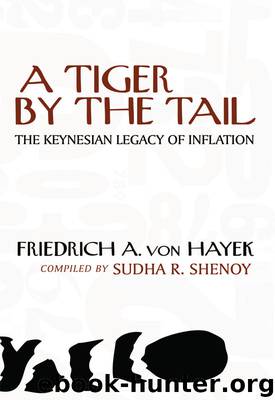A Tiger by the Tail

Author:F.A. Hayek [F.A. Hayek]
Language: eng
Format: epub
ISBN: 978-1-93355-040-4
Publisher: Ludwig von Mises Institute
Published: 2009-11-06T16:00:00+00:00
Changed Character of the Problem
Most people, however, have so little realisation of what has happened that they still support the aspirations of the unions in the belief that they are struggling for ‘freedom of association’, when this term has in fact lost its meaning and the real issue has become the freedom of the individual to join or not to join a union. The existing confusion is due in part to the rapidity with which the character of the problem has changed; in many countries voluntary associations of workers had only just become legal when they began to use coercion to force unwilling workers into membership and to keep non-members out of employment. Most people probably still believe that a ‘labour dispute’ normally means a disagreement about remuneration and the conditions of employment, while as often as not its sole cause is an attempt on the part of the unions to force unwilling workers to join.
The acquisition of privilege by the unions has nowhere been as spectacular as in Britain, where the Trade Disputes Act of 1906 conferred
upon a trade union a freedom from civil liability for the commission of even the most heinous wrong by the union or its servant, and in short confer[red] upon every trade union a privilege and protection not possessed by any other person or body of persons, whether corporate or incorporate.3
Similar friendly legislation helped the unions in the United States, where first the Clayton Act of 1914 exempted them from the antimonopoly provisions of the Sherman Act; the Norris–La Guardia Act of 1932 ‘went a long way to establish practically complete immunity of labour organisations for torts’;4 and, finally, the Supreme Court in a crucial decision sustained ‘the claim of a union to the right to deny participation in the economic world to an employer’.5 More or less the same situation had gradually come to exist in most European countries by the 1920s, ‘less through explicit legislative permission than by the tacit toleration by authorities and courts’.6 Everywhere the legalisation of unions was interpreted as a legalisation of their main purpose and as recognition of their right to do whatever seemed necessary to achieve this purpose—namely, monopoly. More and more they came to be treated not as a group which was pursuing a legitimate selfish aim and which, like every other interest, must be kept in check by competing interests possessed of equal rights, but as a group whose aim—the exhaustive and comprehensive organisation of all labour—must be supported for the good of the public.7
Although flagrant abuses of their powers by the unions have often shocked public opinion in recent times and uncritical pro-union sentiment is on the wane, the public has certainly not yet become aware that the existing legal position is fundamentally wrong and that the whole basis of our free society is gravely threatened by the powers arrogated by the unions. We shall not be concerned here with those criminal abuses of union power that have lately attracted much attention in
Download
This site does not store any files on its server. We only index and link to content provided by other sites. Please contact the content providers to delete copyright contents if any and email us, we'll remove relevant links or contents immediately.
International Integration of the Brazilian Economy by Elias C. Grivoyannis(111059)
The Radium Girls by Kate Moore(12028)
Turbulence by E. J. Noyes(8049)
Nudge - Improving Decisions about Health, Wealth, and Happiness by Thaler Sunstein(7706)
The Black Swan by Nassim Nicholas Taleb(7129)
Rich Dad Poor Dad by Robert T. Kiyosaki(6632)
Pioneering Portfolio Management by David F. Swensen(6300)
Man-made Catastrophes and Risk Information Concealment by Dmitry Chernov & Didier Sornette(6019)
Zero to One by Peter Thiel(5801)
Secrecy World by Jake Bernstein(4753)
Millionaire: The Philanderer, Gambler, and Duelist Who Invented Modern Finance by Janet Gleeson(4478)
The Age of Surveillance Capitalism by Shoshana Zuboff(4292)
Skin in the Game by Nassim Nicholas Taleb(4248)
The Money Culture by Michael Lewis(4207)
Bullshit Jobs by David Graeber(4190)
Skin in the Game: Hidden Asymmetries in Daily Life by Nassim Nicholas Taleb(4006)
The Dhandho Investor by Mohnish Pabrai(3764)
The Wisdom of Finance by Mihir Desai(3746)
Blockchain Basics by Daniel Drescher(3582)
